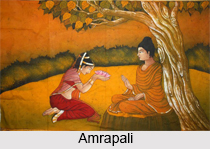 Amrapali was a royal courtesan of the republic of Vaishali in early India around 500 BC. She was the responsible for the origination and the evolution of Buddhist Jataka Tales some 1500 years ago.
Amrapali was a royal courtesan of the republic of Vaishali in early India around 500 BC. She was the responsible for the origination and the evolution of Buddhist Jataka Tales some 1500 years ago.
Amrapali is mentioned in the old Pali texts and Buddhist traditions. She stayed with Gautama Buddha"s mango grove, Ambapali vana which she later donated to him and wherein he preached the famous Ambapalika Sutta.
Early Life of Amrapali
Amrapali was born around 600-500 BC to an unknown parentage, and got her name because after her birth she was found at the foot of a mango tree in one of the royal gardens in Vaishali.
Later Life of Amrapali
Amrapali grew up to be a lady of extraordinary beauty, charm, and grace in the city of Vaishali, the capital city of the Lichchavi clan, one of the eight Kshatriya clans that had united to form the Vajjian confederacy. The Vajjian confederacy is reputed to be the world"s oldest democracy where the King was elected by an electoral college consisting of princes and nobles from the Kshatriya clans. Many young nobles of the republic desired her company. To avoid confrontations among her suitors, she was accorded the status of the state courtesan of Vaishali. Amrapali was declared the "most beautiful" girl at the age of 11. When the undisputed king of Vaishali, Manudev desires to possess Amrapali after he sees her dance performance in the city, he plans to `own` her. He lets his greed get the better of him; murders Amrapali`s would-be-groom, Pushpakumar on the day of marriage and makes an official announcement declaring Amrapali the `bride` of Vaishali i.e. the Nagarvadhu, only to satisfy his mounting sexual urge. Amrapali was made nagarvadhu and Vaishali Janpad Kalayani.
Amrapali in Jain Texts
Ajatashatru, Bimbisara`s son by Queen Chelna later invaded Vaishali due to a dispute with his brothers. He was so moved by her beauty that when Amrapali was imprisoned, he burned the whole of Vaishali. Almost everyone died in the massacre, except his beloved Amrapali, but when she saw the condition of her motherland, she renounced her love for him. Amrapali desired the privilege of serving food to the Gautama Buddha. The Buddhist traditions state that Buddha accepted the invitation against the wishes of the ruling aristocracy of Vaishali due to Ajatashatru. Amrapali received Buddha with her retinue, and offered meals to him. Soon thereafter, she renounced her position as courtesan, accepted the Buddhist way, and remained an active supporter of the Buddhist order.









